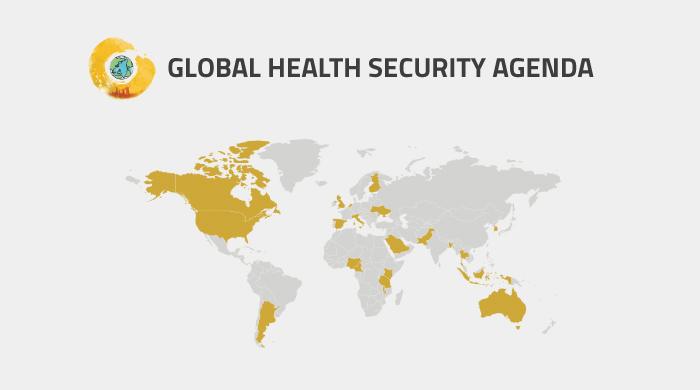
The Global Health Security Agenda (GHSA) is an international effort operating in the field on infection prevention and control. It was launched in February 2014 by a group of 44 countries and organizations including WHO. It was launched in 2014 as a five-year multilateral effort with the purpose to accelerate the implementation of international health regulations set in 2005, particularly in developing countries.
To realise this vision, the GHSA leverages and complements the strengths and resources of multisectoral and multilateral partners to address priorities and gaps in efforts to build and improve country capacity and leadership in the prevention and early detection of, and effective response to, infectious disease threats.
The Global Health Security Agenda (GHSA) is a group of more than 70 countries, international organizations and non-government organizations, and private sector companies that have come together to achieve the vision of a world safe and secure from global health threats posed by infectious diseases.
See the the dedicated page: https://ghsagenda.org/ghsa-members/
The GHSA is governed by a Steering Group comprised of approximately 15 countries, international organizations, and/or non-governmental stakeholders. The primary role of the Steering Group is to provide strategic guidance and direction, including identifying overall GHSA priorities, tracking of progress and commitments, and facilitation of target-driven multi-sectoral coordination and communication among GHSA members.
The Steering Group is headed by a Chair that rotates annually. The primary responsibilities of the GHSA Chair are to organize Steering Group and GHSA-wide meetings and to lead the Steering Group in consultations to review and reaffirm the GHSA 5-Year Roadmap and to guide GHSA in efforts going forward.
During 2022 Italy's is taking the role as Chair of GHSA Steering Group by Thailand, the shift has place on November 19th 2021.
In order to facilitate GHSA alignment with multilateral health security efforts, the GHSA receives advice and guidance from multiple multilateral organizations. These organizations, which include WHO, FAO and OIE, hold the role of Permanent Advisor.
Action Package working groups are led by technical experts from GHSA member countries and partners who work collaboratively to develop and implement initiatives to implement the International Health Regulations (2005). Action Package working groups consist of countries wishing to advance and/or members working to leverage efficiencies and expertise to assist countries in achieving GHSA targets. As a part of the GHSA 2024 development process, the objectives and membership of the Action Packages were renewed. Under GHSA 2024, work will advance under seven Action Package working groups:
Time-limited Task Forces are established by the Steering Group to focus on specific issues in order to support the GHSA in achieving its high-level strategic objectives. Task Forces will work by drawing together interested GHSA members and may be renewed at the end of their predetermined mandate if necessary.
Currently, there are four time-limited Task Forces:
There is also a permanent Task Force, the Action Package Working Group Coordination Task Force, that is charged with updating the Steering Group on Action Package activities and progress and making sure that the Action Packages remain focused on furthering GHSA’s primary objectives and core principles.
Italy takes part in GHSA works related to antimicrobial resistance, surveillance, legal preparedness and sustainable development.
Data di ultimo aggiornamento 30 June 2022